
Recommended Charity Fund: Six-Month Update January 2021
Last July, thanks to the generous support of donors to ACE’s Recommended Charity Fund, we were able to distribute $141,950 to our 2019 Top Charities and Standout Charities. Each charity has provided us with an update on how they’ve used their grants to help animals over the past six months, and we’re excited to share their achievements.
By making a single gift to our Recommended Charity Fund, you can support multiple effective charities working around the globe to reduce animal suffering.
2019 Top Charity Updates
The Humane League
$17,744 grant
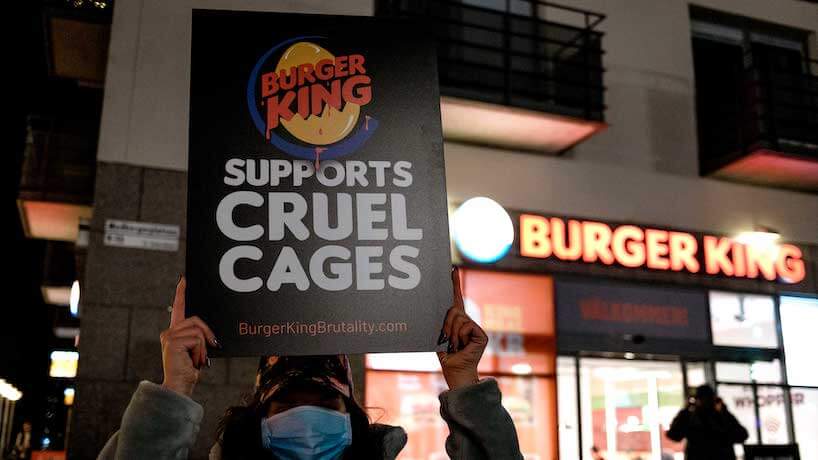
Thanks to ACE’s Recommended Charity Fund, The Humane League (THL) invested in global efforts to reduce the suffering of chickens. After a relentless campaign by the Open Wing Alliance (OWA) combining online and on-the-ground actions (see photo above, courtesy of Djurens Rätt in Sweden), THL secured a global cage-free commitment from Restaurant Brands International, the parent company of Burger King, Popeyes, and Tim Hortons. This far-reaching commitment for egg-laying hens, the first from a major restaurant group, will cover 25,000 restaurant locations in more than 100 countries, including China and several countries in the Middle East and Africa.
In partnership with the Albert Schweitzer Foundation and the OWA, THL secured vital new policies from Aldi, the world’s largest discount retailer, to end some of the worst cruelty faced by chickens raised for meat. This is one of the single largest victories for chickens in history and will reduce the suffering of tens of millions of birds. In addition to adopting the Better Chicken Commitment in Germany (its largest market) and Spain, Aldi has agreed to continue dialogue with OWA organizations regarding other countries, including the United States.
In the U.S., thanks to pressure from THL and its coalition partners, Whole Foods became the first major retailer to adopt chicken welfare standards in alignment with the Better Chicken Commitment. This commitment sets a new precedent for the retail industry and is a big step toward ending live-shackle slaughter once and for all.
The Good Food Institute
$17,744 grant
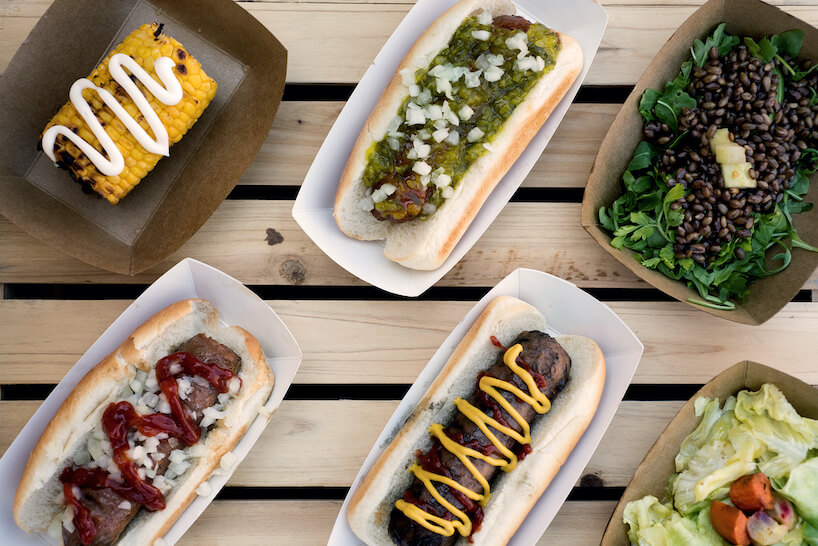
The last six months of 2020 were jam packed with exciting progress for alternative proteins, including two of the biggest milestones to date: At an event co-hosted by The Good Food Institute Israel (GFI Israel) and Aleph Farms, Prime Minister Benjamin Netanyahu became the first head of government to taste cultivated meat. GFI’s Managing Director gave a 10-minute presentation about the organization’s policy goals. After eating cultivated meat, the Prime Minister declared, “Israel will become a powerhouse for alternative meat and alternative protein,” and promised to appoint an alternative proteins czar in his administration. Second, the Singapore Food Agency (SFA) approved the sale of a cultivated meat product by Eat Just. GFI has been meeting with government scientists and SFA representatives for more than three years, and GFI was invited by Eat Just to be among the first to consume cultivated meat produced for commercial sale (video).
GFI celebrated several other notable achievements in the second half of 2020. They were invited to lead the innovation pillar of the sustainable consumption track for the United Nations’ 2021 Food Systems Summit, which will help GFI put alternative proteins onto the policy agenda for NGOs focused on global health and climate change. GFI Europe played a key role in the European Parliament’s rejection of a proposal to censor meat nomenclature of plant-based and cultivated meat products. GFI inspired and assisted a team of researchers at UC Davis with their successful proposal to the National Science Foundation that resulted in $3.55 million for cultivated meat research, the first significant U.S. government funding for cultivated meat research. Finally, GFI met with the Biden-Harris transition team to promote GFI’s “Building Back Better” recommendations for the Biden administration’s economic recovery plan.
GFI wishes to thank ACE’s family of donors for their ongoing support, which makes milestones like these possible. For more highlights from 2020, visit GFI’s top 20 from 2020.
Albert Schweitzer Foundation
$17,744 grant
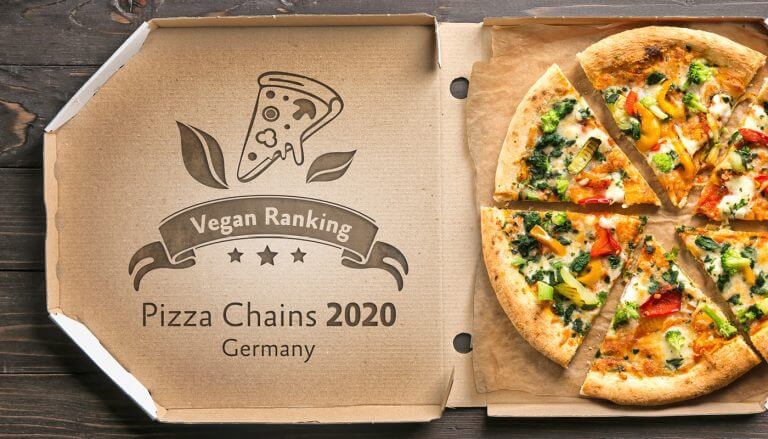
Thanks to the support of ACE’s Recommended Charity Fund, the Albert Schweitzer Foundation (ASF) has been able to achieve a lot for animals in the last six months. For an overview of their successes in 2020, please check out their milestone graphic.
ASF convinced ten new companies to join the European Chicken Commitment (ECC) in the second half of 2020, including an especially significant commitment: Aldi is the first retailer in Germany to raise its animal welfare standards for factory farmed chickens. Aldi’s pledge will not only impact the lives of millions of chickens directly but also help establish the ECC as the new minimum standard. In addition, together with other organizations, ASF convinced Aldi to sign on to the commitment in Spain.
ASF’s smaller but nevertheless important successes will reduce the suffering of chickens in factory farms: Domino’s Pizza Enterprises joined the ECC, as have the dining venue services of universities in five regions. These catering services reach more than 250,000 students and account for over 12 million meals a year. ASF also helped convince two more companies to implement cage-free policies.
A new wave of online actions in ASF’s ongoing campaign against major restaurant chain Subway targeted Mike Kehoe, the new president of the sandwich company’s EMEA region.
In their legal work, ASF scored a major success: A proposed fattening facility for 37,000 pigs in the German town of Haßleben will not be put into operation. With ASF’s fervent support, a long-lasting lawsuit by several organizations against said facility came to a successful conclusion.
For the second time, ASF compiled a vegan pizza ranking. They took a closer look at eight of the biggest pizza delivery services and restaurant chains to determine which one has the best vegan selection. These rankings help promote competition among the companies to be the most vegan friendly.
Anima International
$17,744 grant
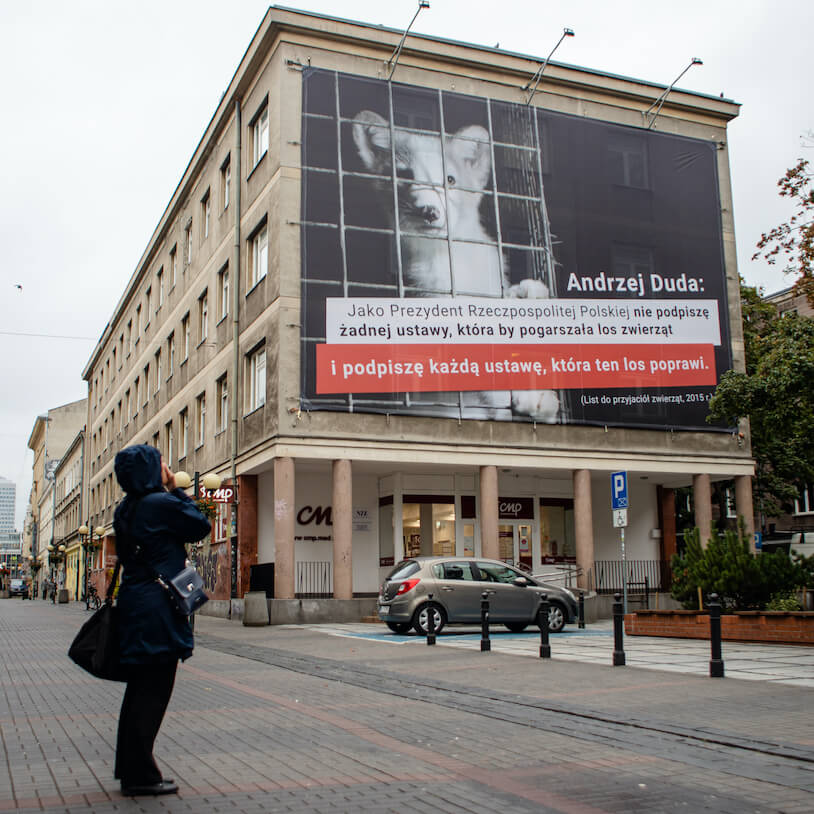
In Poland, Anima International’s team released a new undercover investigation into what is probably the world’s largest mink farm, which houses approximately half a million minks. The lower house of the Polish parliament voted to ban fur farming, an extraordinary step as Poland is the world’s third biggest fur producer. While the bill has yet to pass the final stage to become law, Poland has never been this close to such a historic change. In Estonia, Anima International’s team ensured that the new bill to ban fur farming passed its first reading in the Estonian parliament. In Denmark, the team has been working around the clock to shed a light on the spread of SARS-CoV-2 in hundreds of the country’s mink farms.
Anima International’s corporate teams continued the fight against keeping hens in cages. In Norway, they worked with Norwegian conglomerate Orkla, which has a revenue of around 3.65 billion USD and sells products in over 100 countries, to secure a global cage-free policy. The team in Poland released a new report, Phasing Out Cage Eggs, describing the industry and egg market in recent years. Открытые клетки, Anima International’s Russia-based organization, launched its first cage-free petition. Also in Russia, Anima International helped draw interest in plant-based meat with their campaign Eating Better. The team in Poland published a report focused on the phasing out of live carp sales by retailers in the country. It is a part of the organization’s campaign to ban the sale of live fish in Poland.
2019 Standout Charity Updates
Sociedade Vegetariana Brasileira
$14,195 grant
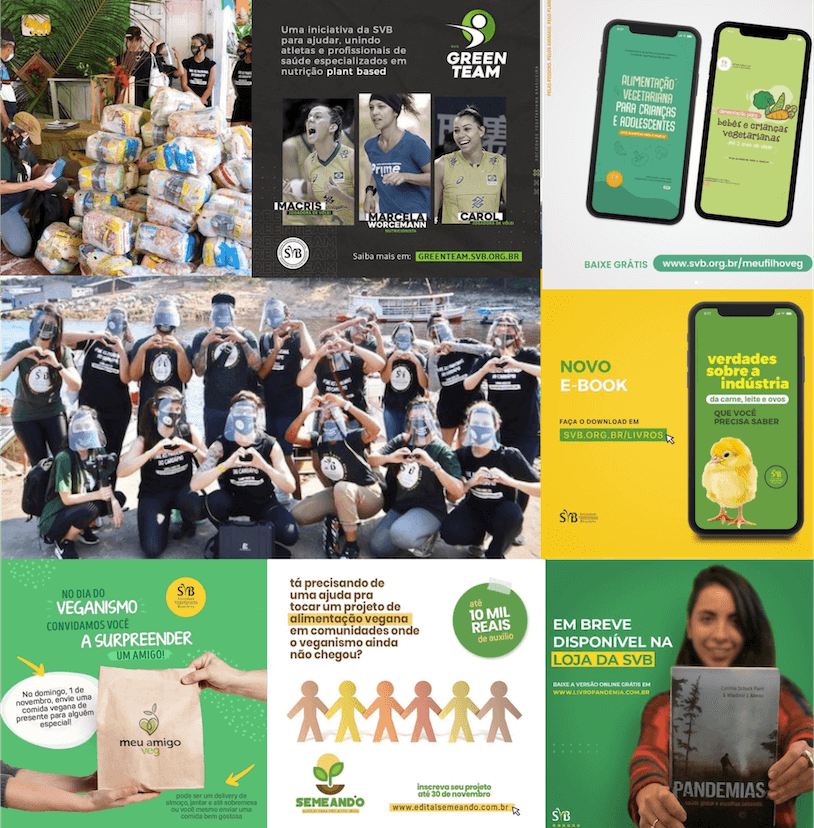
During the past six months, SVB used their grant to fund part of the development of new and ongoing projects, such as Semeando, a new grantmaking program initiated as a call for proposals of projects aimed at promoting a vegan diet in vulnerable areas of Brazil. Ten projects were selected from the 48 applications received, then narrowed down to five following a round of interviews. The final five projects will receive 2,000 USD each from a generous donor to aid their development, with SVB’s assistance and oversight.
The grant covered staff-related costs for the organization of a two-day grassroots action in Manaus, supported by local volunteers and another donor, to bring awareness to deforestation and promote plant-based food choices; the equivalent of 2,300 vegan meals were delivered. It also covered accommodation expenses for four staff members to organize the action locally. Additionally, the grant covered costs related to the hiring process of four staff positions: Campaign Manager, Campaign Assistant, Events Manager, and Events Assistant.
SVB created the Green Team to connect high-performance athletes with health professionals who specialize in plant-based nutrition to assist such athletes in safely adopting a healthy plant-based diet. They also launched a new e-book: Verdades sobre a indústria de carne, leite e ovos (translation: truths about the meat, milk, and egg industry). A second e-book has been drafted, with dietary guidelines for vegetarian children and teenagers.
SVB used a portion of the grant to create an online campaign for World Vegan Day, encouraging individuals to deliver vegan meals and treats to their non-vegan friends. The grant also helped fund the printing and distribution of 1,000 books titled Pandemics, Global Health, and Consumer Choices. The books were mailed to SVB members and key influencers as part of SVB’s efforts to raise awareness and put meat consumption at the center of the debate on emerging infectious diseases.
Sinergia Animal
$14,195 grant
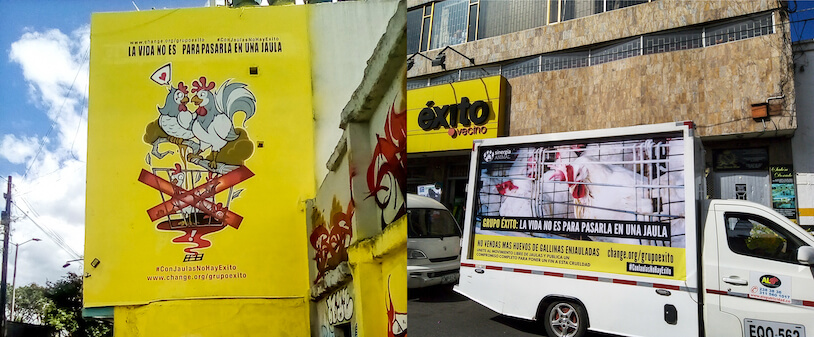
Sinergia Animal used its Recommended Charity Fund grant to support various programs. To overcome logistical challenges due to the pandemic, they strengthened their online activities for cage-free egg campaigns and corporate engagement efforts, which led to five new commitments covering 18 countries. Additionally, they used high-impact strategies such as billboard cars and a huge mural on a busy street in Colombia for their campaign asking Grupo Éxito, the country’s largest retailer, to go 100% cage free. Resources were also invested in expanding their online volunteer community, which now has 20,000 activists worldwide and includes new countries such as Peru and Ecuador.
In Brazil, Sinergia Animal launched online pig and dairy welfare campaigns directed at BRF—one of the largest meat producers in the world—and Nestlé. Together, the two petitions garnered more than 150,000 signatures. A commitment to phase out gestation crates was secured from one of Brazil’s largest restaurant chains, Grupo TrendFoods.
Three new undercover investigations were published, reaching more than 1.9 million people on social media. Two were exposés of egg farms in Ecuador and Thailand. The third involved strong images of baby buffalos being illegally slaughtered in India. In India and Ecuador, local celebrities narrated the promotional videos to maximize impact.
Sinergia Animal also launched their Media Center, a website that compiles pictures and footage of their investigations under a Creative Commons license. This will make resources freely available to journalists, organizations, and activists without making credit mandatory.
Their media outreach efforts resulted in 276 media mentions, several of them in mainstream outlets. This work is used to strengthen campaigns and programs to influence public opinion in countries where animal welfare issues have not yet gained much relevance in the media.
Faunalytics
$14,195 grant
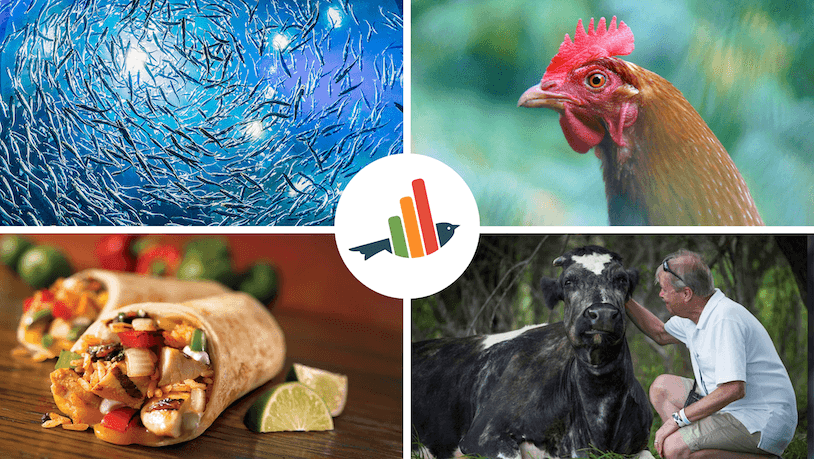
Thanks to the generous support of ACE’s Recommended Charity Fund donors, Faunalytics completed four major studies in the second half of 2020.
Faunalytics’ Animal Product Impact Scales rank 98 categories of animal-derived food products according to the total days of animal suffering and the total number of animal lives each product requires in terms of U.S. daily consumption. The numbers reveal which food formats should be prioritized by alternative protein companies and avoided by consumers to make the biggest impact for farmed animals.
With consideration of the relative neglectedness of chickens and fishes in comparison to other farmed animals, Faunalytics produced a study, Beliefs About Chickens and Fish & Their Relation to Animal-Positive Behaviors, which reveals what U.S. consumers believe about these animals (e.g., chickens need room to explore, and fish can feel pain) and whether people are willing to protect them.
To help determine the effectiveness of animal sanctuaries, Faunalytics and Farm Sanctuary partnered in a study: A Farm Sanctuary Tour’s Effects on Intentions and Diet Change. The survey revealed that going on a sanctuary tour can indeed positively influence people’s dietary choices and attitudes toward animals.
In Faunalytics’ study The State of Animal Advocacy in the U.S. & Canada: Experiences & Turnover, they examined the complex experiences of animal advocates in order to determine why employees and volunteers move from organization to organization or leave the movement entirely. Their findings identified several opportunities to improve advocate retention.
They also updated their Global Animal Slaughter Statistics and Charts and published over 100 library articles summarizing external studies on important topics in animal advocacy. Finally, Faunalytics launched a brand new impact center, which includes an in-depth blog outlining how they measure and evaluate the effectiveness of their work.
Compassion in World Farming USA
$14,195 grant
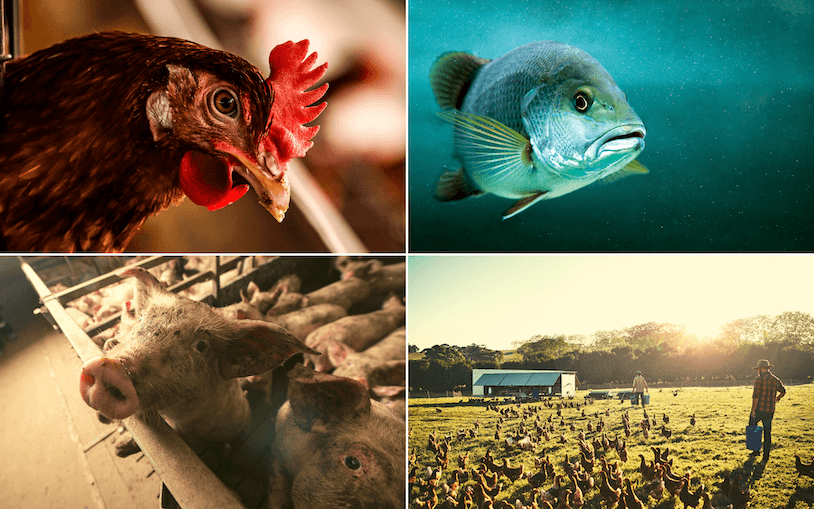
Compassion in World Farming USA (Compassion) achieved much progress in the second half of 2020.
To kick-start the third quarter, Compassion celebrated Colorado’s decision to go cage-free, a commitment to ban cages on Colorado farms, set standards for cage-free confinement, and require that all eggs sold in Colorado be cage-free.
Shortly thereafter, Compassion launched a campaign calling for fish certification programs to implement welfare standards and/or improve those already in place. They also led a campaign asking consumers to contact their representatives and demand that they support the Safe Line Speeds in COVID-19 Act, which would prohibit the dangerously fast line speeds that put both animals and slaughterhouse workers at risk.
Compassion engaged with the Special Supplemental Nutrition Program for Women, Infants, and Children (WIC) to outline and discuss the many reasons why WIC must expand its approved foods list to include cage-free eggs, as most state WIC programs do not currently authorize these purchases.
In September, Compassion held a webinar to address the summary findings of Global Animal Partnership’s much-anticipated chicken breed study conducted at the University of Guelph. The findings reinforce a point long argued by animal advocates: Industry-standard breeds have poorer welfare outcomes than slower-growing breeds.
Compassion, as a founding member of the Regenerative Organic Alliance (ROA), was thrilled for ROA’s launch of the Regenerative Organic Certified (ROC) certification standard for food, fiber, and personal care products—now the highest standard for organic agriculture in the world.
Finally, Compassion launched its fourth annual edition of EggTrack—and took it global this year. Despite the pandemic, many companies not only reported the percentage of cage-free eggs in their supply chains but also made progress toward their goal to be 100% cage-free. In the last four years, EggTrack has contributed significantly to the market shift from caged chicken eggs to cage-free eggs.
Federation of Indian Animal Protection Organisations
$14,195 grant
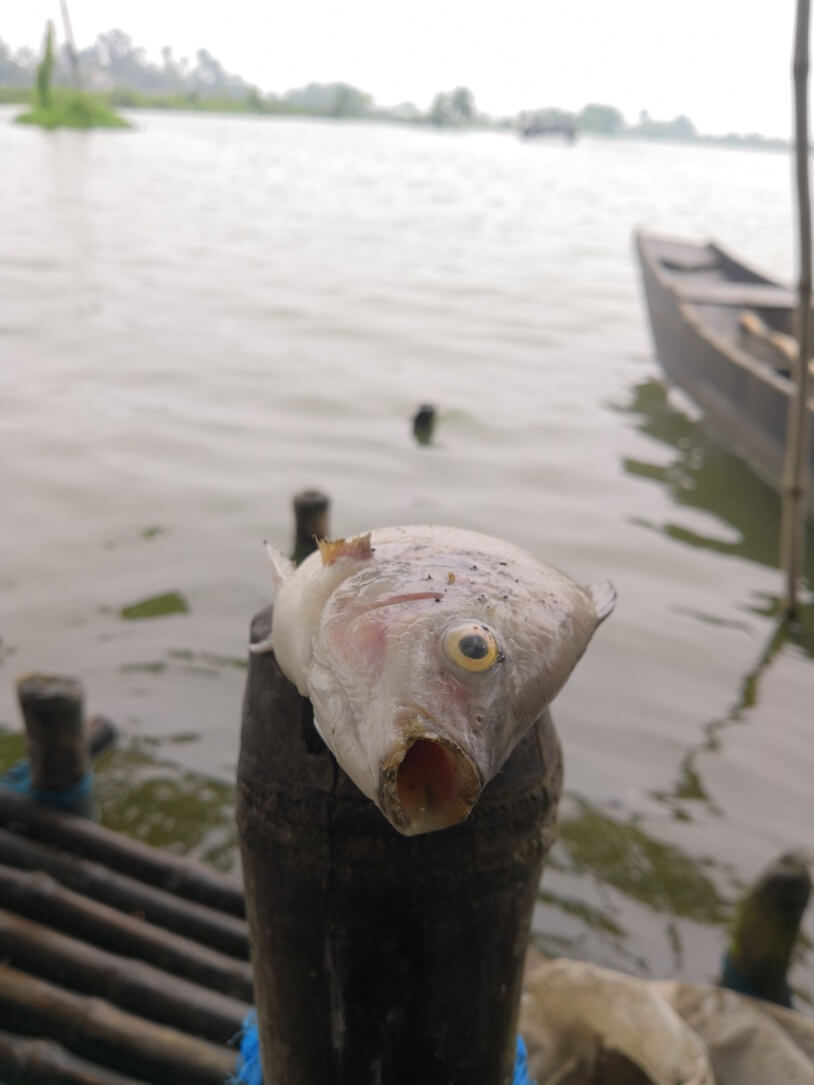
The Federation of Indian Animal Protection Organisations (FIAPO) launched India’s first extensive investigation report on aquaculture after studying 161 freshwater and 80 brackish water farms. The report was picked up by major news publications, and advocacy for introducing new policies has begun at the Central government level under the guidance of an expert advisory group of four eminent individuals.
An investigation was undertaken in 29 dairies in Gujarat, and the report was submitted to bureaucrats concerned with initiating relevant policies. Seventeen Members of Parliament (MPs) in the state who read the report have agreed to meet with FIAPO to better understand the role they could play in alleviating the suffering of animals. Another investigation was carried out in 22 dairies in Uttar Pradesh to provide supporting material for the litigation filed against unregulated dairies in the state. FIAPO published a comprehensive report on illegal slaughter of animals in 10 cities to accelerate policy advocacy efforts at the Central government level to regulate illegal slaughter.
To strengthen FIAPO’s movement building efforts, 17 member organizations in seven cities were empowered to lead the actions against illegal meat shops in their cities. Meetings were held with MPs and Members of the Legislative Assembly (MLAs) from four major political parties, including an MP from Hyderabad who showed interest in helping FIAPO take further action against illegal meat shops.
FIAPO undertook a competency mapping analysis of its staff to understand the existing skill level and identify areas of improvement. An organizational development consultant’s services were sought to identify and upgrade key links that could optimize the overall performance of the organization.
FIAPO’s plant-based advocacy on digital media generated 6,932 sign-ups for their Eat the Plant Not the Planet challenge, which garnered five influencer endorsements and three partnerships with influencers who will develop videos as part of the challenge.
If you are inspired by these achievements, please consider making a donation to support ACE’s Recommended Charity Fund. Your gift today will help reduce future animal suffering.
Filed Under: Recommendations, Recommended Charity Fund Tagged With: charity recommendations, recommended charities, recommended charity fund, updates
About Heather Herrell
Heather joined ACE in 2018, continuing her professional career in the nonprofit sector. A lifelong animal advocate and donor, she is committed to creating a more compassionate world for all creatures. Heather is excited to use her fundraising expertise in a context where these skills can help achieve the greatest positive impact for animals.
Nice to see some progress!